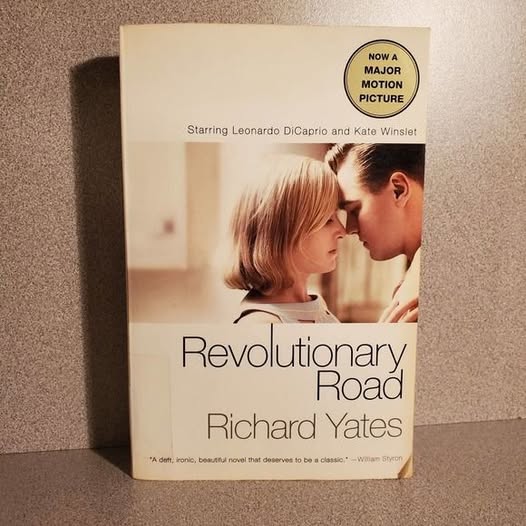Richard Yates’ Revolutionary Road hits with the brutal elegance of a sucker punch to the solar plexus. This 1961 masterpiece isn’t about marital discord it’s about the slow suffocation of the American soul, set against the deceptively manicured lawns of 1950s Connecticut. The Wheelers, Frank and April, are the couple you know maybe the couple you fear becoming bound together not by love but by shared delusions of exceptionalism.
Their tragedy unfolds with the inevitability of a train wreck in slow motion. Frank trudges to a Manhattan office job he pretends is temporary, spinning elaborate fantasies about his own potential. April, a failed actress turned reluctant housewife, stares at the cracks in their suburban façade with mounting desperation. When she proposes an escape to Paris a last-ditch bid for authenticity the plan ignites like a flare in their gray existence. But dreams this fragile can’t survive contact with reality. A surprise pregnancy and a sudden promotion expose their rebellion as what it always was: another performance.
Yates wields his prose like a scalpel, dissecting the lies we tell ourselves to get through the day. Watch as Frank’s pathetic office affair reveals his hunger for validation, or how April’s final act of defiance becomes the only honest moment in their marriage. The supporting cast—the well-meaning Realtor Mrs. Givings, the Wheelers’ only “friends” the Campbells, and the institutionalized son John who sees through everyone serve as a Greek chorus underscoring the horror: these people aren’t special. Their suffering is ordinary. That’s what makes it unbearable.
What elevates Revolutionary Road beyond mere domestic tragedy is its unflinching diagnosis of a national sickness. The post-war American Dream isn’t just a lie it’s a collective narcotic, convincing intelligent people that conformity is temporary and compromise is noble. Yates strips away the anesthesia, leaving us raw to the truth: most rebellions die not with a bang, but with a sigh over a cocktail shaker.
The novel’s power lies in its merciless clarity. There’s no villain here except self-awareness avoided for too long. When April finally makes her irrevocable choice, it feels less like a plot twist than a chemical reaction—the inevitable result of mixing combustible dreams with the oxygen-free environment of suburban normalcy.
Nearly sixty years later, in our age of curated Instagram lives and side-hustle escapism, Yates’ vision rings terrifyingly prescient. We’ve swapped martinis for artisanal coffee, Madison Avenue for Silicon Valley, but the Wheelers live on in every soul who’s ever thought, I’m better than this, while continuing to go through the motions.
That final line “And when the silence had gone on long enough, he filled it the only way he could” lands like a judge’s gavel. The sentence isn’t just Frank’s; it’s ours. Read it and weep. Then read it again and recognize yourself.

